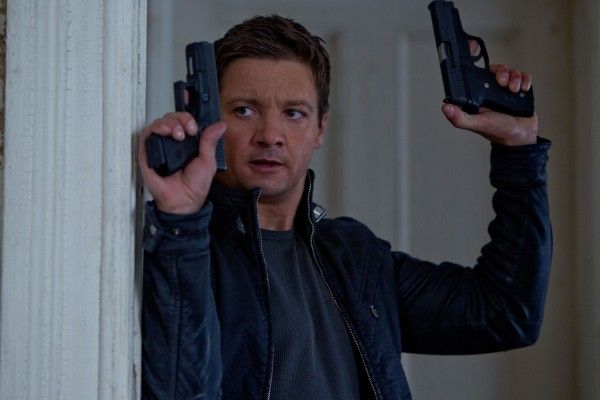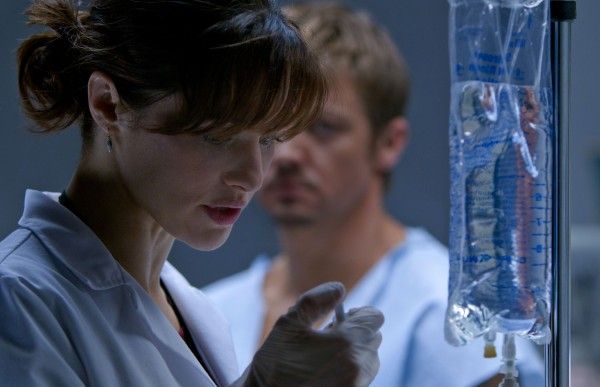Director Paul Greengrass created what it meant to be a "Bourne" movie with The Bourne Supremacy and The Bourne Ultimatum. If the James Bond movies are girls, gadgets, cars, and supervillains, then Bourne was going to be about intense action scenes, desperate chases, paranoia, and political commentary. Sadly, Greengrass did not return to the Bourne franchise, and co-writer and director Tony Gilroy has set the series back with the flabby and forgettable The Bourne Legacy. Gilroy attempts to write his own set of rules by playing against a traditional three-act structure, which is fine in theory, but in practice it creates a film that's constantly losing momentum, and never sure where to focus its energy. The movie's saving grace is Jeremy Renner, who gets to be in the mold of Jason Bourne but find new strengths and weaknesses that set him apart from the eponymous spy. Sadly, the rest of The Bourne Legacy never follows Renner's lead to find a fresh direction while still retaining what worked about the past two movies.
Gilroy starts his movie off in a fairly clever fashion. Just as there's overlap between Supremacy and Ultimatum, Legacy overlaps with the third act of Ultimatum. Bourne's chaotic chase through New York City and the revelation of Blackbriar and Treadstone has led the government to call in Retired Colonel Eric Byer (Edward Norton) to shut down any Treadstone-related projects. One program, "Outcome", created super-soldiers by giving them blue and green pills (colloquially called "chems") to boost their mental and physical strength, respectively. Byer liquidates the program by killing off eight of the nine soldiers involved, but his drone strike doesn't manage to eliminate Aaron Cross (Renner). Cross fakes his death by (in a laboriously detailed scene) destroying his vital-signs transmitter, but instead of going out for revenge, he makes his way to a pharmaceutical company that makes his chems only to find that all of the scientists were murdered in a coverup killing spree except for one, Dr. Marta Shearing (Rachel Weisz). Cross and Shearing then go on the run so he can keep her safe from Byer's agents, and she can get him his blue meds before he goes all Flowers for Algernon.
The plot ties to the previous Bourne movies are superficial at best. Joan Allen, David Strathairn, and Scott Glenn all make cameos, but they're not active participants in the plot. Beyond the shadowy-government-agency-vs-powerful-spy dynamic of the first three movies, nothing really makes Legacy stand out as either a Bourne movie or even a generic spy flick. Greengrass' shaky-cam style has become so commonplace among action films that it no longer provides any distinction when Gilroy employs it for his movie. Furthermore, his action scenes lack the cohesiveness and verve of Greengrass' since Gilroy doesn't use cinematographer Oliver Wood, editor Christopher Rouse, and composer John Powell. The set pieces in Legacy aren't bad (one features a particularly memorable kill); they're just not as good as what came before.
Tony Gilroy shouldn't be beholden to what Greengrass did, and I admire his initial attempts to find a new direction for the franchise. There's a promising scene at the beginning of the film between Cross and a mysterious agent (Oscar Isaac) he finds in the Alaskan wilderness. Gilroy keeps us guessing as to whether or not we should trust Isaac's character, and the director gets some great tension out of the scenes while still managing to provide new details about Cross' character (e.g. he's chattier than Bourne, and he's openly inquisitive). But then Gilroy proceeds to constantly blow his pacing while never finding a way to build on the Bourne franchise or even provide a serviceable spy thriller. If one of Aaron Cross' best traits is his ability to use his personality to deceive others, it may be a good idea not to have him in the Alaskan wilderness for forty minutes with almost no one to talk to.
Legacy also falls short on the antagonist's side. After having Byer and his crew effortlessly kill almost everyone in Outcome, they have nothing to do and so they leave the picture until they realize Cross is still alive. By this point, these characters have lost all their presence and now they seem incompetent to boot. Jason Bourne always felt a half-step ahead of his pursuers; Aaron Cross is a half-hemisphere ahead.
Matters are further complicated when you throw Shearing into the mix. Legacy ends up running into the same problem as The Bourne Identity: saddling the protagonist with a one-dimensional accomplice. Rachel Weisz is an Oscar-winning actress, and The Bourne Legacy asks that her character be nothing more than frantic and terrified. It's an honest reaction to the character's circumstances, but not a particularly interesting one. Gilroy has previous directly two strong films—Michael Clayton and Duplicity—but here he fails to understand the difference between what's effective and what's appropriate. When one of Shearing's co-workers goes on a shooting spree and methodically murders everyone in her laboratory, it's absolutely harrowing. It also feels like a screen from a completely different movie.
Gilroy's lead actor has a much better idea of how to evolve the franchise rather than simply fumble around what's been done before. Renner looks past the demeanor of Jason Bourne and examines the character's broader talents. He then resets those traits into a character who feels like a secret agent in the vein of Bourne, but not a carbon copy. Both characters are scared of their pasts and both have to use their brains and brawn to escape government forces, but Renner plays Cross as someone who misdirects not through timing but through personality. He's a super-powered conman who is more invested in forgeries and fake identities than making sure he gets off a train at the right moment.
Jeremy Renner is the right actor playing the right character in the wrong movie. If the Bourne franchise continues, he should absolutely return, but the onus will fall on the writer/director to have a better understanding of what makes the Bourne series unique. At the very least, it should understand some basic rules: If a clandestine government agency is the bad guy, then don't have it drop out for a third of the movie. If your main character is good at interacting with other people, don't have him wrasslin' wolves in the middle of nowhere for ten minutes. If he's traveling with a companion, maybe she should do more than scream and be confused. Tony Gilroy breaks these rules and not for the better. Greengrass provided a solid template for the franchise, and while asking Gilroy for a thoughtful political subtext is a tall order, he still could have found a balance between what had come before in the franchise and what could come next. But with the exception of Renner, The Bourne Legacy lacks anything that would make for a compelling spy thriller let alone a worthy addition to the Bourne franchise.
Rating: 5.7 out of 10




